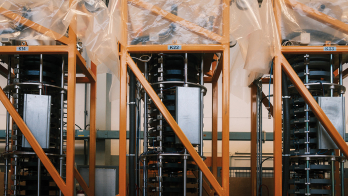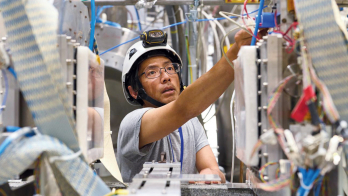Maurice Jacob, a former president of the European Physical Society, argues that a future dynamic economy will depend on a strong physics base.

Last year, at the first ever joint symposium organized by ESO, CERN and ESA, in Garching, Germany, David Southwood, science director at ESA, quoted a statement from the EU Commission saying that: “Europe should become the most competitive and dynamic knowledge-based economy in the world.” The EU statement is full of sense and summarizes a legitimate ambition. The question is how to achieve such a goal and how physics can help in achieving it.
The structure and pace of change of modern economies is such that wealth and power are no longer found in the abundance of available minerals, fossil fuels and raw materials, but lie instead with the ability and know-how to process these commodities into high-technology products that bring a high added value. A competitive economy thrives on innovations, displacing older products with better and more efficient new ones. It is clear that important innovations no longer come from well-targeted inventions, but result from new knowledge and know-how. For example, while it was possible for the invention of the incandescent lamp to result from ingenious trials based on known facts and existing technology, the invention of the transistor would not have been possible without the new ways of thinking brought by quantum mechanics, and therefore without a long, open development of basic research – research that was curiosity-driven and essentially conducted for its academic interest. This change of style in the process of innovation is here to stay and is an important element in developing a knowledge-based economy.
The succession of discovery and innovation phases seen over the past two centuries in the world economy is a well-documented fact. Nevertheless, if one is to base future success on innovations to come, it is worth preparing for them through a healthy research effort in which physics should provide its share of acquired new knowledge. However, one cannot use knowledge as a mere commodity, called upon when needed. We should instead consider it as a constantly developing entity, bringing new insight, new facts and, sometimes, providing new ways of thinking, as nature is much richer than our imagination. One may safely assume that in future the most innovative pieces of new knowledge will come from open research driven basically by human curiosity and yielding unexpected results.
A few years ago, when young French hospital doctors were on strike, they marched with the slogan “At Christmas no scanner, at Easter the churchyard” (which rhymes in French). The scanner had quickly become a key instrument for them, but would there be any scanners without basic research in physics a few decades ago? The answer is no! There are many similar examples. Today many topical questions are associated with the genome, which will play a key role in understanding the mechanisms of life and pave the way to new biotechnologies. Here we see many physicists taking an important role in genome analysis. It is not surprising that Paolo Zanella, who first directed the European Bioinformatics Unit (the EMBL’s outstation in Cambridge that manages databases related to research on the genome), was a former head of CERN’s computer division. Genome research depends on methods and computational means recently developed in particle physics, and for which the physicist’s culture – that is the physicist’s ways of thinking and acting – is instrumental.
What relative priority should we then attach to domains like particle physics, whose research objectives seem to be very remote from standard human conditions? It is tempting to say that further knowledge about quark dynamics or CP violation is unlikely to bring any useful application, and the same can also be said of many astrophysics questions associated with the structure and evolution of the universe. Yet this research, because it takes us far away from the natural conditions met in everyday life, has acquired a special style of its own, which turns out to be highly conducive to new conceptual and technical developments. Even though its objectives may look very academic, such research should be considered as an asset in the building of a sustainable knowledge-based economy. As Victor Weisskopf said: “The problems at the frontier of science are exactly those that cannot be solved with established methods.” This is where the new methods originate.
Consider information technology, a clear priority for a knowledge-based economy. Key developments, such as the Web in the recent past and the Grid today, originated from particle physics and again rely heavily on the physicist’s culture. Further progress in many sciences, in particular life sciences and environmental sciences, will depend on efficient handling of very large amounts of information. The large LHC collaborations have become efficient think-tanks for that purpose. The fact that each LHC detector will have to deal with petabytes (1015) of information per year – a million times that contained in the human genome – is a strong selling point when trying to convince hard-nosed people that the LHC is worth the effort and money put into it, notwithstanding its great physics potential.
Physics research is already worth supporting as part of human culture: man does not live by bread alone. A successful economy should allow us to put questions about the deep nature of the world around us, but even on very practical grounds, supporting physics research is also a key element when searching for a dynamic knowledge-based economy.
• Extracted from the closing talk at a special workshop of Marie Curie Fellows on Research and Training in Physics and Technology, held at CERN in 2002.








